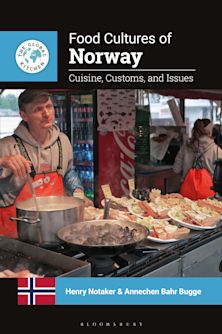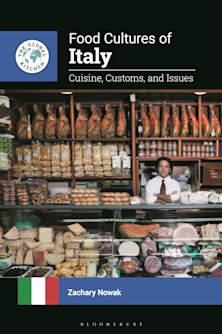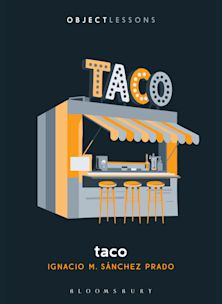- Home
- ACADEMIC
- Food
- Culture and Society
- Culinary Capital
This product is usually dispatched within 1 week
- Delivery and returns info
-
Free US delivery on orders $35 or over
You must sign in to add this item to your wishlist. Please sign in or create an account
Description
TV cookery shows hosted by celebrity chefs. Meal prep kitchens. Online grocers and restaurant review sites. Competitive eating contests, carnivals and fairs, and junk food websites and blogs. What do all of them have in common? According to authors Kathleen LeBesco and Peter Naccarato, they each serve as productive sites for understanding the role of culinary capital in shaping individual and group identities in contemporary culture.
Beyond providing sustenance, food and food practices play an important social role, offering status to individuals who conform to their culture's culinary norms and expectations while also providing a means of resisting them. Culinary Capital analyzes this phenomenon in action across the landscape of contemporary culture. The authors examine how each of the sites listed above promises viewers and consumers status through the acquisition of culinary capital and, as they do so, intersect with a range of cultural values and ideologies, particularly those of gender and economic class.
Table of Contents
Theorizing Culinary Capital
Fixing Dinner/Fixing The Self: the Contradictions of New Trends In Food Procurement
Television Cooking Shows: Gender, Class and The Illusory Promise Of Transformation
Democratizing Taste? Culinary Capital In The Digital Age
Culinary Resistance: State Fairs, Competitive Eating, and "Junk" Foodies
Conclusion
Works Cited
Product details
| Published | Dec 01 2012 |
|---|---|
| Format | Hardback |
| Edition | 1st |
| Extent | 160 |
| ISBN | 9780857853820 |
| Imprint | Berg Publishers |
| Dimensions | 9 x 6 inches |
| Publisher | Bloomsbury Publishing |
About the contributors
Reviews
-
Sometimes a new phrase gets coined in food writing, and a few years later you wonder how you wrote without it: think Crosby's 'Columbian exchange' or Long's 'culinary tourism.' In five years we'll wonder how we did without 'culinary capital' to talk intelligently about contemporary food and foodways.
Zachary Nowak, Director, Food Studies Program The Umbra Institute, Perugia, Italy
-
Culinary Capital is a ground-breaking study that will challenge those of us in cultural and food studies to consider the importance of culinary capital and the ways in which it permeates even the most quotidian areas of our lives, whilst provoking us to consider how we can reinscribe food with the very elitist tenets that we often work to dismantle.
Psyche Williams-Forson, Associate Professor and Co-Director of Graduate Studies, University of Maryland, USA
-
Summing Up: Recommended. All levels/libraries.
R. R. Wilk, Indiana University, CHOICE
-
The so-called “culinary capital” is the central thesis of the authors in this deceptively-slim book which examines how our individual and group identities are shaped by what we eat and drink... It will provoke thought, lead to some “light bulb” moments of realisation and possibly change some perceptions that you may have... As befitting an academic book, there is a mass of notes, bibliographic references and an extensive index at the rear, which is a good aid for research and further study.
Yum.fi

ONLINE RESOURCES
Bloomsbury Collections
This book is available on Bloomsbury Collections where your library has access.



































